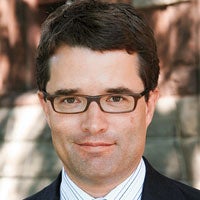Former CEO-turned-felon David Logan took his first step down the slippery slope of white collar crime as a city administrator in a small town in Minnesota, when he accepted a truck as a gift from two men who had a city contract. When the men went broke, Logan learned the truck had been placed in his name and he’d have to pay off the bank loan. “So it turned out not to be the greatest bribe in the world,” Logan said on October 14, at a special HLS event, How a CEO and a Lawyer Became Felons: Two Inside Stories of White Collar Crime; A Talk with Former Prosecutors and Offenders. (Watch a webcast of the panel).
But, Logan added, “It got me thinking about how doing things for other people might end up being good for me.” After that, Logan began taking bribes and keeping track of them on a scrap of paper he hid in his bedroom closet. Later, when he became CEO of a growing hog business, he helped cook the books—and eventually found himself serving more than five years in a federal prison camp.
For Richard Juliano, a now-disbarred attorney who was a key witness in the corruption prosecution of former Illinois Governor George Ryan, the first steps on the slippery slope began when he worked Ryan’s office, where state funds were routinely misused, especially during election campaigns. The transgressions started out small, said Juliano, who worked for Ryan while an undergraduate and then law student at the University of Chicago, including a stint as deputy chief of staff. “If you experience it for years and you’re conditioned to think of it in a different way, and it’s a competitive environment, and you think the other side is doing the same thing, you find ways to rationalize what you’re doing,” he said.
Juliano, who now works for a trade association, received a sentence of four years probation and 350 hours of community service, which he is fulfilling in part by speaking to students and professionals to warn them of how he fell from grace.
Both Juliano and Logan are part of a unique program created by Hank Shea ’81, a former assistant U.S. Attorney in Michigan, who for more than 20 years prosecuted numerous white-collar cases against businesspeople, lawyers, and other professionals. Over the past few years, Shea, a Senior Distinguished Fellow at the University of St. Thomas School of Law’s Center for Ethical Leadership in the Professions, has appeared more than 50 times with felons, many of whom he convicted, at law schools, business schools, and other groups in an effort to deter crime and improve safety, and to examine how people in power begin making unethical decisions. (Shea prosecuted Logan.)
“I became convinced five or six years ago that prosecutors and judges and legislators are not the answer to the problem,” said Shea . “I think the key to changing moral conduct is to educate people, not by inculcating values, necessarily, but by teaching people about ethical decision-making.”
Co-sponsored by the HLS Office of Clinical and Pro Bono Programs along with the Harvard Business School, the event was moderated by HLS Assistant Clinical Professor of Law Alex Whiting, a former assistant U.S. Attorney in Massachusetts and former Senior Trial Attorney at the International Criminal Tribunal for the former Yugoslavia. Shea spoke to Whiting’s Government Lawyering class, and, before the HLS-wide event, he spoke to HLS Professor David Wilkins’ class on the Legal Profession.
Logan and Juliano advised students to avoid trouble by not bending rules even on very small things. “If you are asked by a supervisor or colleague to do something you’re uncomfortable with, and the rationale is that this is what everybody does or does for competitive advantage, that should be a red flag for you,” said Juliano. You must be willing to walk away from a job, even if it represents a long-held dream, as working for the former governor was for him, he said. And, he stressed, cooperating with the government and telling the truth saved him from a harsher sentence.
The best approach when faced with any kind of ethical decision is to ask how you’ll feel if your actions see the light of day, and your kids, spouse, friends and others find out, Shea said.
Said Logan, “Greed in general is what it is, usually, and it’s absolutely not worth it.” Addressing the HLS and HBS students in the audience, he added, “The problem you guys have got is, you’re smart. That’s a glitch. People who are smart have a tendency to figure out and connive better than people who are dumb.”
Both Logan and Juliano, while taking full responsibility for their actions, also warned against getting involved with unethical people. “Greed, arrogance, and bad company—once you mix those, you might as well jump off a building because it’s going to turn out badly for you,” said Logan.
